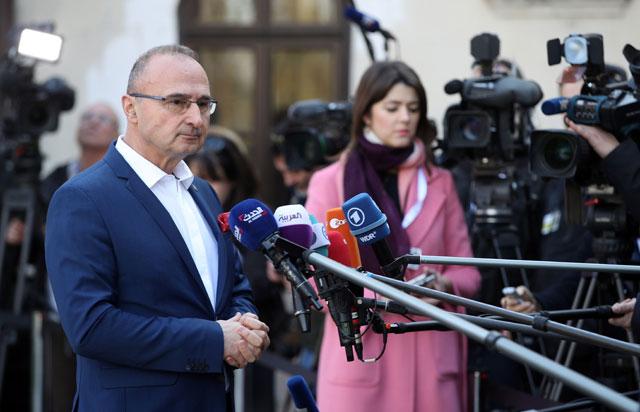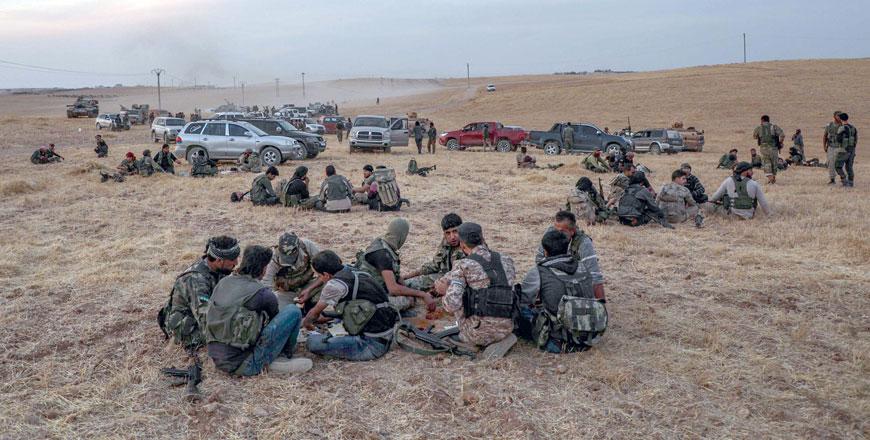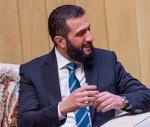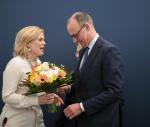You are here
Work with Turkey, NATO tells EU amid migrant crisis
By AFP - Mar 05,2020 - Last updated at Mar 05,2020

Croatian Minister of Foreign and European Affairs Gordan Grlic Radman (left) speaks to media as he arrives at the Informal meeting of EU Foreign Affairs ministers at Luznica Castle near Zagreb, on Thursday (AFP photo)
ZAGREB — With tensions growing and accusations flying between Turkey and the EU over an escalating migrant crisis, the head of NATO has warned Europe it must find a way to work with "important ally" Ankara.
EU members accuse Turkey of unleashing a wave of migrants for political ends, in an increasingly bitter confrontation over a new crisis on the Greek border.
Thousands have gathered on the Turkey-Greece frontier since President Recep Tayyip Erdogan gave migrants the green light to leave for Europe last week, as he seeks more support from the international community in Syria.
The drama prompted a bitter tirade against Ankara from French Foreign Minister Jean-Yves le Drian, who told lawmakers in Paris it was time for a "frank debate" at NATO about whose side Turkey was on.
But, in an interview with AFP, NATO Secretary General Jens Stoltenberg called for a more pragmatic approach, saying the European Union would have to find a way to cooperate with Ankara.
"We have to understand that when you speak about the migrant and refugee crisis we speak about a common challenge, which we have to address together," Stoltenberg said.
"The only way to address the situation on the border is by working together."
Realpolitik
There was support for this view from Norbert Roettgen, chair of the foreign affairs committee in the German parliament and a contender to succeed Chancellor Angela Merkel.
"We have to face the reality and if you want to help the refugees you have to cooperate with Turkey," Roettgen said at the Institut Montaigne in Paris, calling for a dose of realpolitik.
"I cannot see a strategy without Turkey. Face the reality, it might not delight you but Turkey is the border state between Europe and the Middle East."
The migrant drama began after Russian-backed Syrian forces killed 34 Turkish troops in northern Syria, prompting Erdogan to seek greater assistance from allies — both military and to support 3.7 million refugees and migrants currently hosted in Turkey.
France is one of a number of NATO members exasperated by Turkey's actions in recent months and years — including its unilateral incursion into Syria to fight Kurdish militias that had been important allies for the anti-Daesh coalition.
At the French Senate on Wednesday, le Drian reeled off a list of "ambiguities" in Turkey's actions, including its growing closeness to Moscow, its controversial territorial claims in the eastern Mediterranean and the migrant "blackmail".
"We are in the same alliance," he said.
"We will need to quickly have a frank and serious public discussion with Turkey to know where each stands and where our common interests lie, otherwise we will not get past this."
Because NATO takes decisions by unanimity, divisions make it unlikely that the alliance as a whole will agree to support Turkey.
An urgent meeting of NATO's ruling council called by Turkey last week resulted in agreement to continue existing air defence support — including AWACS surveillance flights and a Spanish Patriot missile battery.
But beyond a general pledge to see what more could be done, no concrete new measures were agreed.
A simpler route for Ankara would be to win bilateral support from allies, and last month Defence Minister Hulusi Akar said it would be ready to receive US Patriots.
Turkish problem,
or French?
NATO usually does everything it can to solve rows in private, and Stoltenberg refused to be drawn on Le Drian's call for a public debate.
But he stressed the strategic significance of Turkey — an allied country bordering the Middle East with a long Black Sea coastline, hosting the vital Incirlik air base, used by the US.
"Turkey is an important ally because Turkey has been key not least in the fight against terrorism," Stoltenberg said.
"Through the global coalition to defeat ISIS, NATO allies and NATO have been able to liberate all that territory and all these people, not least by using infrastructure based in Turkey."
While rows with Turkey have been explosive — the normally guarded Stoltenberg has publicly voiced grave concerns about Ankara's S-400 missile system purchase from Russia — there have been slow-burning tensions with France in recent months.
Stoltenberg's implied rebuff to Le Drian came after he last month dismissed President Emmanuel Macron's suggestion that French nuclear weapons — which are not made available to NATO — could be part of a European deterrent.
And Macron's call in an explosive Economist interview in November — in which he said NATO was suffering "brain death" — for a strategic dialogue at the alliance met with a similarly frosty response.
Related Articles
LUXEMBOURG — EU foreign ministers on Monday voiced concern and condemnation at Turkey's assault on Kurdish forces in northern Syria, but war
BRUSSELS/ISTANBUL — NATO gave Turkey its full political support in fighting militants in Syria and Iraq at an emergency meeting on Tuesday b
GENEVA/BRUSSELS — The United Nations and human rights groups warned on Tuesday that a tentative European Union deal to send back all irregul


















